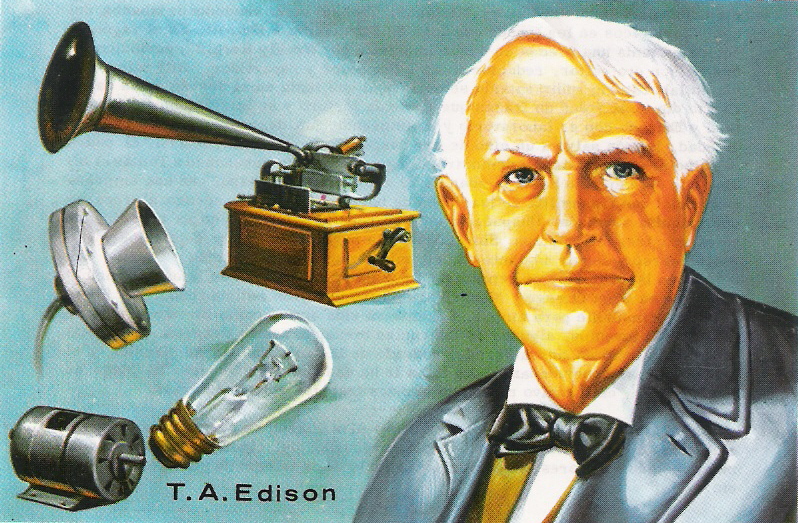Life path
Thomas Alva Edison was born on February 11, 1847 in Mylan, Ohio, USA. At the age of 12 he worked as a newspaper delivery boy, and at the age of 16 he became a telegraph operator. In 1868, Edison began inventing, and already in 1870 he organized a laboratory in Newark, in 1876 in Menlo Park, and since 1887 he organized and headed his own invention center. Edison’s inventions include an improved Bell telephone and an incandescent lamp; in 1877, Edison invented a phonograph, which he improved in 1889; he also developed a lighting system, designed a rotary switch, a megaphone, an electric meter, a socket and base, a recorder, etc.
Edison introduced parallel switching of lamps into use, built extremely powerful electric generators for that time, and in 1881 launched the first thermal power plant for supplying electricity with an extensive network. Edison’s achievements also include: the invention of the railway brake, an apparatus for recording telephone conversations, alkali-iron-nickel batteries, and an improved cinematographic camera. It was Edison who came up with the idea of saying “Hello” when starting a telephone conversation. This word stuck and is still used today. In 1883, the inventor was the first to observe the phenomenon of thermionic emission (Edison effect). Edison has more than 1,000 patented inventions. The talented inventor Thomas Alva Edison died on October 18, 1931 at the age of 85 in West Orange (New Jersey, USA).
Some quotes


Thomas Edison’s contribution to the development of world industry
Generated by artificial intelligence
Thomas Edison, an American inventor and businessman, made significant contributions to the development of the world industry, particularly in the late 19th and early 20th centuries. Some of his key contributions include:
Electric Lighting System
Edison is perhaps best known for his work on the development of the practical electric light bulb. In 1879, he successfully demonstrated a long-lasting, practical incandescent light bulb, which marked a major advancement in lighting technology. This invention had a profound impact on industry, as it allowed factories and other workplaces to operate longer hours and more efficiently.
Electric Power Distribution
Edison also played a crucial role in the establishment of electric power distribution systems. He built the first power plant in New York City, known as the Pearl Street Station, in 1882. This power station supplied electricity to a concentrated area, paving the way for the widespread use of electric power in industries and homes.
Electricity Generation and Distribution Networks
Edison contributed to the development of the electrical grid. His vision included not only the creation of power plants but also the establishment of a network to distribute electricity over long distances. This laid the foundation for the modern electrical infrastructure that powers industries globally.
Motion Pictures
Edison was also a pioneer in the development of motion pictures. He invented the kinetoscope, a device for viewing moving pictures, and the kinetoscope parlors, where people could watch short films. While Edison’s contributions to the film industry were more on the technological side, they nonetheless had a significant impact on entertainment and later developments in the film industry.
Phonograph
Edison invented the phonograph, a device for recording and reproducing sound. This innovation had implications for the music industry and audio recording, laying the groundwork for the development of the modern music recording industry.
Research and Development Laboratory
Edison was one of the first inventors to establish a large-scale research and development laboratory. The Menlo Park laboratory, later followed by the West Orange laboratory, became a model for industrial research facilities. This approach to innovation contributed to the systematic development of new technologies and products.
Thomas Edison’s contributions to the development of industry were multi-faceted, spanning electricity, entertainment, and sound recording. His inventions and innovations not only improved industrial processes but also had a lasting impact on various aspects of daily life.

